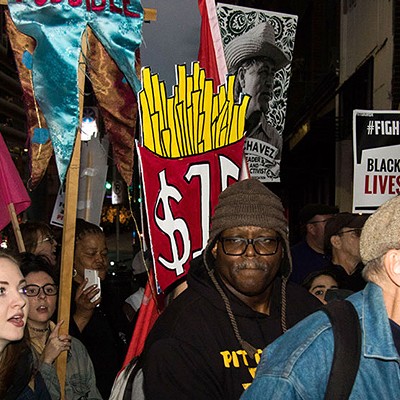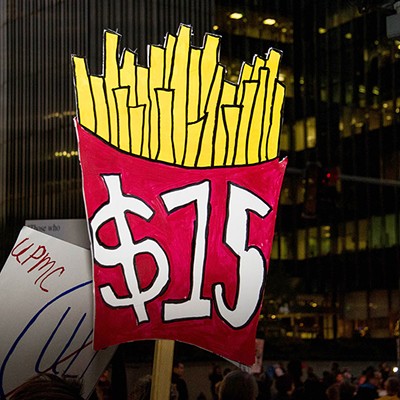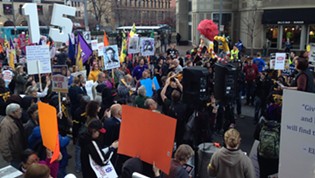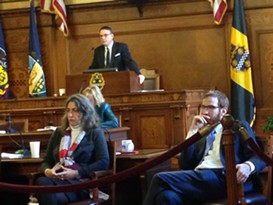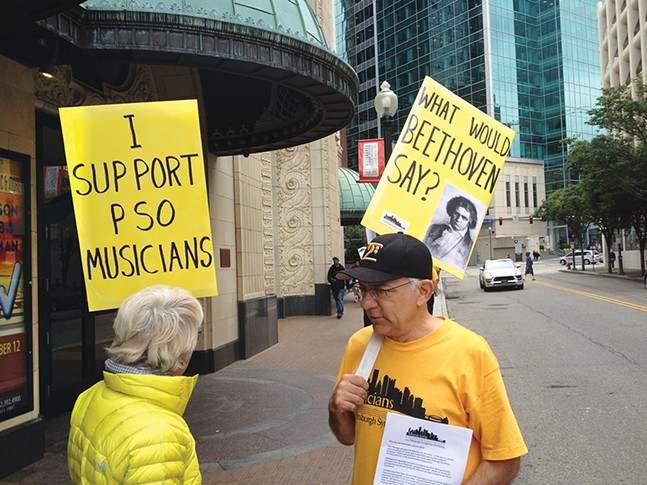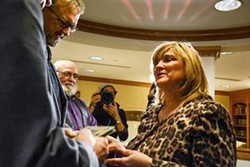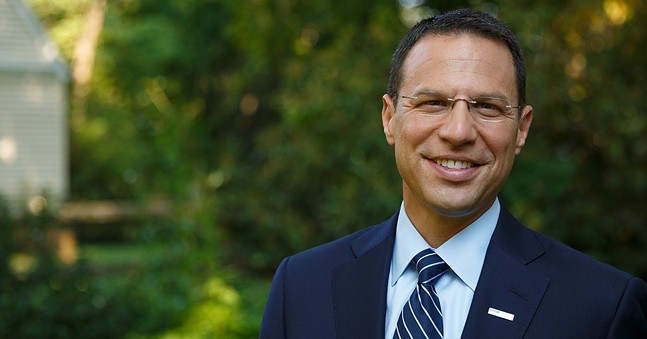Wednesday, November 30, 2016
Tags: Richie Cole , Don Aliquo , Supersuckers , Jesse Dayton , Gallows Bound , African Children's Choir , Psychic Twin , Red Fang , Torche , Whores , FFW>>
On Nov. 29, hundreds of protesters took to the Downtown streets demanding that local fast-food restaurants, Giant Eagle grocery stores, and UPMC hospitals increase their minimum wages to $15 an hour and allow workers to form unions. The march was part of a national Day of Disruption, where cities across the country are protesting workers rights.
More than 200 marchers shut down Liberty Avenue outside of the federal building and marched throughout Downtown to the McDonald's restaurant on Stanwix Street where CP News Editor Rebecca Addison reports some protesters were arrested.
Right before the march started, traffic was disrupted and more than 20 buses lined up on Liberty Avenue waiting for the march to start. More than a dozen police officers were present during the march. They provided escort for the marchers on motorcycles and bicycles. None were in riot gear.Police are arresting #Fightfor15 protesters blocking street in Downtown Pittsburgh pic.twitter.com/RAdzmn0yGR
— Rebecca Addison (@PghReporter) November 29, 2016
Glenn Grayson of labor coalition One Pittsburgh spoke to the crowd before the march about the frustration with stagnant wages for workers in the service industry. “Enough is enough with business as usual,” said Grayson. He also expressed anxiety that the group’s fight will be even harder when President-elect Donald Trump assumes office in January. “Our future president has declared that the current minimum wage is too high.”
One of the workers to walk off the job today to protest was Erika Lee, a shuttle bus driver for UPMC who currently makes $13 an hour. She lives in Mckeesport with her three children. Lee said she had to take a stand to fight for her and her co-workers’ rights, specifically allowing them to form a union, which UPMC has blocked for years.
“There has been no progress on forming a union,” said Lee. “There is constant intimidation. Many of us stood up today, but not all of us. Some of us, they feared retaliation.”
Linda Zinkhan works at the Market District Giant Eagle in Robinson Township. Her catering department recently joined United Food and Commercial Workers Local 23 and was drawn to protest because of the hardships she and six other employers went through in joining UFCW. Zinkhan said that management stalled contract talks and made workers attend anti-union meetings.
“It has been a clawing fight,” said Zinkhan.
Tags: One Pittsburgh , Giant Eagle , UPMC , Fight for $15 , McDonald's , Video , Slideshow , Image
Tuesday, November 29, 2016
“Even I didn’t know, I only knew that I was different,” says Kraus. “I do remember my parents seeking medical attention to help them understand who and what I was, and help me understand who and what I was.”
Kraus says it never went as far as his parents sending him to “conversion therapy,” the practice of using therapy or spiritual healing to change a person’s sexual orientation from gay or bisexual to straight, but he fears that people and families are vulnerable to this practice.
So, today Kraus and City Councilor Dan Gilman introduced an ordinance to ban conversion therapy on minors within Pittsburgh city limits.
“The City of Pittsburgh bears the responsibility to protect all of its residents and this legislation defends LGBTQIA+ youth against the destructive psychological and physical impact of forced conversion therapy,” said Gilman in a press release. “By passing this legislation, the City is standing up for equality and ensuring that Pittsburgh is a welcoming city for all.”
Kraus says he wanted to introduce this legislation now because of articles detailing the LGBT-related positions of some of President-elect Donald Trump’s cabinet members “absolutely terrified” him. (Vice President-elect Mike Pence supported government-funded conversion therapy while serving in Congress in 2000, and has not disavowed that support.)
“One of the things that scares me about this public acclimation of the possible appointees of the new administration would be to redirect funding from HIV patients in critical need, and take that money and redirect it into conversion therapy,” says Kraus. “I find this to be Neanderthalic in thought.”
(In a boon to advocates for HIV treatment, today Pittsburgh City Council also passed unanimously a will of council that urges all doctors to test for HIV during all routine visits.)
Kraus says that support of conversion therapy from the Trump administration might give support to homophobes and others who attack LGBT people, such as how Trump’s victory emboldened some to bully and harass minorities, refugees and immigrants. Kraus says this legislation is a call to the LGBT and their allies that Pittsburgh is a safe place for them.
Six states, including California, Illinois and New Jersey, have passed conversion-therapy bans for minors. In the last year, other cities have followed suit, like Cincinnati, Miami Beach and Seattle. Kraus says that Pittsburgh has always been a leader in protecting LGBT-rights and says he expects “full support from council” on the passage of the bill.
Kraus adds that he has conferred with legal council and believes the ordinance will hold up, if challenged in court.
Tags: Pittsburgh City Council , Bruce Kraus , Dan Gilman , Donald Trump , Mike Pence , Keeping Up With the Council , Image
Monday, November 28, 2016
Wreck Loose: Long Time Listener, First Time Caller
To download, right-click here and select "save as."
Tags: Wreck Loose , Long Time Listener First Time Caller , Brillobox , FFW>> , Image , Audio
Friday, November 25, 2016
Nonetheless, the event has grown in popularity since its 2010 inception and the Strip District wants to take advantage of that momentum with one of Pittsburghers' favorite things: free parking.
According to Strip District nonprofit Strip District Neighbor's Twitter feed, all meters in the strip district will be free of charge tomorrow (Nov. 26) for Small Business Saturday. Strip District Neighbors also created a handy deal guide that details more than a dozen sales and deals of participating retailers, restaurants and bars.
Deals include 10 percent off all furniture at boutique furniture store Hot Haute Hot, 10 percent discount on all purchases at Mancini's Bread Co., and $5 off purchase of $25 at Bradley's Book Outlet.
The deals and free parking last all day. Check individual business' websites for their listed hours.
Tags: Strip District , Pittsburgh , Small Business Saturday , Neighbors in the Strip. American Express , Image
Wednesday, November 23, 2016
The musicians of the Pittsburgh Symphony Orchestra and the symphony’s management reached an agreement today to end the strike by signing a new five-year contract.
“The management and Board of Trustees of the Pittsburgh Symphony are unwavering in a collective commitment to our orchestra's artistic mission and to its excellence — past, present, and future,” Melia Tourangeau, president and CEO of the symphony, said in a press release. “We asked the musicians to be a partner in the solution to the exceptionally difficult financial position we are working to correct and we are grateful for their sacrifice. They have, indeed, come together with us in a powerful way to help position the Pittsburgh Symphony’s future.”
The new contract includes a 10.5 percent decrease in musician wages in the first year, but one that will only effectively be a 7.5 percent cut due to “a generous contribution from an anonymous donor.”
After a salary freeze in the second year, wages will slowly climb back to their original level by the fifth year of the contract.
Also, the musician's benefits plan will be transferred to a defined contributions plan, while three open positions within the 99 piece orchestra will remain unfilled for the duration of the contract.
The strike, the symphony’s first since 1975 and second ever, began on Sept. 30 after months-old negotiations between the two sides in spite of federal arbitration.
The musicians, members of American Federation of Musicians Local 60-471, called for the strike after management refused to back down on demands for a 15 percent pay cut to the musicians, as well as reduced benefits and freezing three open positions in the orchestra, up to management's discretion.
Management called for the cuts to improve the symphony’s financial situation, including $11 million in debt and a $1.5 million budget deficit.
Musicians countered that the symphony’s financial situation was not as bad as management claimed, and worried the cuts would make the symphony less attractive and hurt its competitiveness for top performers.
While still upset at the scope of the contracts cuts, Micah Howard, chair of the Pittsburgh Symphony Orchestra Committee, is optimistic for the future of the orchestra following the agreement.
“These were painful and substantial concessions,” Howard said in a release. “But we agreed to work with management to face our financial challenges head-on. Both parties came together in the spirit of true compromise, to ensure that we can resume performing at Heinz Hall.”
Negotiations restarted in early November as both sides agreed to an independent audit of the symphony's finances.
The strike led to the cancellation of all symphony concerts up to Dec. 5, as well as shows by touring entertainers such as rock star Elvis Costello and comedians Brian Regan and Lewis Black who stood in solidarity with the striking musicians.
In honor of the new contract, the PSO will host two free concerts, on Dec. 2 and 4 at Heinz Hall.
Tags: Pittsburgh symphony orchestra , music , strike , labor , Image
Tags: The Reverend Horton Heat , Nashville Pussy , Unknown Hinson , Lucky Tubb , Mike Stout , Cris Jacobs , Xaddax , Microwaves , Anicon , FFW>>
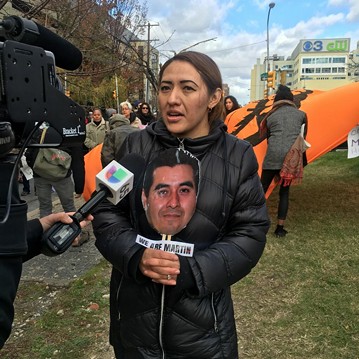
Now ICE is hinting this isn’t going to happen. ICE officials issued this statement to Pittsburgh City Paper when asked if they had plans to release Esquivel-Hernandez: “ICE intends to take custody of the individual after the full resolution of the pending federal charges, to include any potential conviction and subsequent prison term.”
Esquivel-Hernandez has no prior criminal record and has been a volunteer in the Latino community since arriving in Pittsburgh. He attempted to enter the country illegally four times to be with his family, before finally succeeding in 2012. He has been charged with felony re-entry, but his lawyer is currently negotiating for a lesser sentence. If negotiations succeed, the only thing keeping Esquivel-Hernandez from being released from a private prison in Youngstown, Ohio, is ICE maintaining a detainer on him.
On Nov. 21, the Esquivel-Hernandez family and his advocates from Latino-rights group Casa San Jose took their request directly to the ICE field office in Philadelphia to demand that ICE regional officer Thomas Decker release Esquivel-Hernandez.
“Martin is a man that has always found ways to help others without thinking of himself,” said Esquivel-Hernandez’s wife, Alma Brigido, in a press release. “Thomas Decker and ICE, you use your power for injustice, depriving us from having the possibilities to support our families. We are all the same, you all have families, so do we."
More than 50 rally attendees, including 14 from the Pittsburgh area, protested outside the ICE office and held a 30-foot orange banner reading “Bring Martin Home.” Gabriel McMorland, of the Pittsburgh advocacy-group the Thomas Merton Center, attended the Philadelphia rally and said that ICE officials didn’t address the protesters, but he was confident their message was made.
“ICE did not come outside,” says McMorland. “But I think they knew we were there. Our banner was bigger than a minivan.”
Esquivel-Hernandez traveled 5,000 miles on an eight-month ordeal to reunite with his family, sleeping in abandoned homes, crawling through thorny bushes and avoiding rattlesnakes. The U.S. Attorney’s office of Western Pennsylvania, deemed him a “flight risk” in court documents, and he has been detained in Youngstown for six months.
McMorland disagrees that Esquivel-Hernandez is a flight risk. “This is a man who has risked his life to get here,” says McMorland. “I struggle to imagine who can be less of flight risk. He risked his life multiple times to be with his family in Pittsburgh. Why would he leave?”
The rally was supported by Pennsylvania Immigration and Citizen Coalition, a statewide immigrant-rights group. The rally also marched to Arch Street Methodist Church in Philadelphia, where another Mexican undocumented immigrant, Javier Flores of Philadelphia, has taken up asylum to avoid deportation. Flores has a wife and three children, all of whom are U.S. citizens.
“We recognize that the struggle to keep families together and push back against the harsh enforcement policies of the Obama administration is not about just one city or one family,” said Sundrop Carter of PICC in a press release. “That is why we are building a statewide movement, so we can fight side by side to protect our communities, and fight for just and humane policies.”
Tags: Martin Esquivel-Hernandez , Pennsylvania Immigration and Citizens Coalition , Casa San Jose , Thomas Merton Center , Philadelphia , Image
“When I was diagnosed, the doctor told me to settle my things,” Chomko says.
Even after multiple procedures, his prognosis did not improve. The cancer had been removed from much of his body, except for parts of his liver. Without a donation, he would die.
Five years ago, on April 1, at 6 a.m., he found out he had his donation, because of the tragic death of Brian Hensell, 24, who had been killed in a car crash two days earlier.
Knowing how close he was to death, and looking at how he survived, Chomko feels grateful for each day that goes by.
“You have a higher sense of urgency to do things in your life,” he says.
On Monday night in Shadyside, at Family House, an affordable, home-like residence for the families of Pittsburgh hospital patients, Donate Life Pennsylvania and the Center for Organ Recovery and Education hosted a dinner to let Chomko and other organ recipients give thanks in person to the family of the man who saved their lives.
Hensell, had his heart, liver, pancreas and kidneys given to three men. Melvin Protzman, 63, received Hensell's heart; Brian McTiernan, 61, received his kidneys and pancreas; and Chomko, his liver.
Monday was Hensell's family's first chance to meet all the recipients and their own families. His mother, Mary Grace Hensell, had met Protzman about a year after his transplant, but had yet to meet Chomko or McTiernan.
“My son gets to live on in each and every one of you,” she said. “My son wanted it, and we wanted it too.”
At her side was her brother Louis Sico. He saw the meeting as a chance to make sense of his family’s personal loss.
“I’m so happy to see the families that ... his life has tremendous meaning [for],” Sico said. “He’s lived on through three people.”
Hensell's mother also handed out small books to each of the recipients of her son's organs, featuring pictures of him and details about his life.
“I just want you to know him a little bit like how we know him,” she said to the three men.
The combined families then sat down for dinner. As the table was slowly covered in food, Protzman, the recipient of Hensell’s heart, gave a short prayer and asked everyone at the table to say what they were thankful for.
Looking at Hensell's mother, he remembered when they first met and how they bonded over her loss.
“Mary Grace, I am thankful for you and all the things we have done together to remember Brian,” Protzman said. “My gift to you, is you can listen to Brian’s heart whenever you wish.”
With a small picture of her son — engraved with “a heartbeat lasts a mere second, but your son’s gift is eternal” — looking on from behind her, Mary Grace Hensell felt solace. By meeting the assembled recipients, she felt that they would always honor her son for the second chance he gave them.
“I just want them to remember Brian,” she said. “The worst thing for a mother is for your son to be forgotten.”
Tags: organ donor , medicine , Pittsburgh , John Chomko , Brian Hensell , Mary Grace Hensell , Image
Tuesday, November 22, 2016
So how in the world did Democrat Josh Shapiro, arguably running on the most progressive principles of any Pennsylvania candidate, win the state’s attorney-general election?
John Hanley, a political-science professor at Duquesne University, believes that most Pennsylvanians weren’t very aware of the candidates for non-national seats like state attorney general, and thus stuck more to their partisan allegiances.
“When you look at this set of election results, take the top of the ballot and separate from the rest,” says Hanley. “Most people don't know who these people are, so most people rely on the standard partisan bias.”
So having almost one million more Democrats registered in Pennsylvania than Republicans helped Shapiro and fellow Democrats Eugene DePasquale (state auditor general) and Joseph Torsella (state treasurer) secure victories by surprisingly similar margins, says Hanley.
But G. Terry Madonna, a pollster and professor of public affairs at Franklin & Marshall College, in Lancaster, Pa., thinks it was a concentrated effort by the Philadelphia suburbs that secured Shapiro his victory.
“The [Democrats] won all three statewide row-office elections, largely because of more ticket-splitting in the Philly 'burbs,” wrote Madonna in an email to Pittsburgh City Paper. “Shapiro ran many TV commercials there which certainly helped him. [And those commercials] did not focus on a liberal agenda.”
Shapiro on his campaign website championed progressive policies like LGBT rights, prosecuting frackers who pollute, and standing up to Wall Street, but his commercials mostly concentrated on the state’s opioid epidemic and support from the police. And when it came down to it, Madonna says, Shapiro might just have been a better campaigner than his opponent, Republican John Rafferty.
“The Republicans did very little by comparison,” wrote Madonna. “Shapiro was more aggressive campaigning, going all over the state.”
Tags: Josh Shapiro , Donald Trump , Pat Toomey , John Rafferty , PolitiCrap , Image




